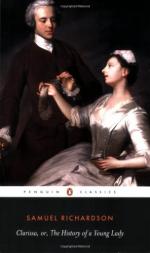* See Vol. IV. Letter XXXIX. and Vol. V. Letter VIII.
Besides, had Lovelace added ribbald jests upon religion, to his other liberties, the freedoms which would then have passed between him and his friend, must have been of a nature truly infernal.
And this father hint was meant to be given, by way of inference, that the man who allowed himself in those liberties either of speech or action, which Lovelace thought shameful, was so far a worse man than Lovelace. For this reason he is every where made to treat jests on sacred things and subjects, even down to the mythology of the Pagans, among Pagans, as undoubted marks of the ill-breeding of the jester; obscene images and talk, as liberties too shameful for even rakes to allow themselves in; and injustice to creditors, and in matters of Meum and Tuum, as what it was beneath him to be guilty of.
Some have objected to the meekness, to the tameness, as they will have it to be, of Mr. Hickman’s character. And yet Lovelace owns, that he rose upon him with great spirit in the interview between them; once, when he thought a reflection was but implied on Miss Howe;* and another time, when he imagined himself treated contemptuously.** Miss Howe, it must be owned, (though not to the credit of her own character,) treats him ludicrously on several occasions. But so she does her mother. And perhaps a lady of her lively turn would have treated as whimsically any man but a Lovelace. Mr. Belford speaks of him with honour and respect.*** So does Colonel Morden.**** And so does Clarissa on every occasion. And all that Miss Howe herself says of him, tends more to his reputation than discredit,***** as Clarissa indeed tells her.******
* See Vol. VII. Letter XXVIII. ** Ibid. *** Ibid. Letter XLVIII. **** See Letter XLVI. of this volume. ***** See Vol. II. Letter II. and Vol. III. Letter XL. ****** See Vol. II. Letter XI.
And as to Lovelace’s treatment of him, the reader must have observed, that it was his way to treat every man with contempt, partly by way of self-exaltation, and partly to gratify the natural gaiety of his disposition. He says himself to Belford,* ’Thou knowest I love him not, Jack; and whom we love not, we cannot allow a merit to; perhaps not the merit they should be granted.’ ‘Modest and diffident men,’ writes Belford, to Lovelace, in praise of Mr. Hickman, ’wear not soon off those little precisenesses, which the confident, if ever they had them, presently get over.’**




